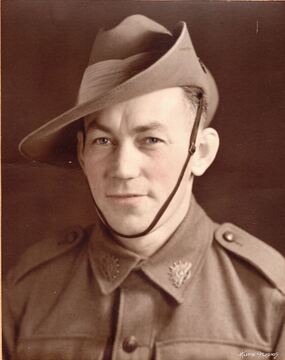DAY, Archibald Clarence
| Service Number: | N375475 |
|---|---|
| Enlisted: | 8 January 1942 |
| Last Rank: | Private |
| Last Unit: | Not yet discovered |
| Born: | Manor Park, England, 16 January 1908 |
| Home Town: | Liverpool, Fairfield, New South Wales |
| Schooling: | St Anthonys Primary, Forest Gate, England |
| Occupation: | Not yet discovered |
| Died: | Erina, New South Wales, Australia, 23 November 2004, aged 96 years, cause of death not yet discovered |
| Cemetery: |
Woronora General Cemetery, New South Wales |
| Memorials: |
World War 2 Service
| 8 Jan 1942: | Enlisted Australian Military Forces (WW2) , Private, N375475 | |
|---|---|---|
| 2 Jun 1944: | Discharged Australian Military Forces (WW2) , Private, N375475 |
Help us honour Archibald Clarence Day's service by contributing information, stories, and images so that they can be preserved for future generations.
Add my storyBiography contributed by Peter Day
Arch was the son of Charles Edward and Ellen (O'Brien) Day, born January 16, 1908 in his home in Manor Park, London, England. After Charles's war service in the Australian 55th, the family moved to Australia in 1920. Arch was the youngest of four boys, the eldest, Charles Errol Francis Day, killed in action on the Western Front, August 16, 1917. The following information is in Arch's own words, dictated to his Grandaughter, Erika Anne Day.
Aged 34y4m, Arch was called up 14th May, 1942 – this was late, due to having two children and running his own business. As a seasoned Motorcyclist, Arch considered his best suited role in the armed forces would be as some kind of dispatch rider. This was not to be.
He first trained at Tamworth NSW, then onto Bonegilla, Victoria, training as a Signalman Operator for employment with an Armoured Division Signals. He then proceeded to Townsville for further training before potentially being sent to Milne Bay NG.
“Initially I was earmarked to be in ‘Armoured Division signal” – that’s tanks, etc. I was one of the first group of recruits to undergo an aptitude test and this revealed that I had the ability to acquire new knowledge and was particularly suited for the signals which is a very specialised unit handling the communications equipment. My training was a continuous schooling in this subject. I specialised in signal procedure and was a qualified operator. Signals worked in small groups attached to other units but were governed by their own officer – NCO and were considered an elite group of specialists.
"When I was on my way to Milne Bay in New Guinea my little group were to be air support control sigs. where we would monitor & control bombing etc. of the Japanese, a rather dangerous job as you would be close up to the action. Unfortunately or fortunately, depending on how one looks at it, while waiting for the ship to NewGuinea at NGFARD (New Guinea forward Area receiving Depot) while engaged in an exercise I damaged my knee and was carted off to hospital."
Arch said that he used to keep a tobacco tin in the front pocket located on his lower leg trousers and that he fell a considerable height on his leg, smashing his knee.
"Subsequently boarded B1 instead of A1! My little group sailed off without me and I was not allowed to ever proceed overseas."
"When I was finally rescued by Signals I was delivered up to Advanced H.Q L of C signals at Townsville."
Arch spent months in Charters Towers Hospital.
He then was sent to 13th staging Camp at Townsville handling personnel movements even though he was without rank, at that time. Then transferred to Advance LHG Sigs Townsville and promoted to Corporal and became Signals Supervisor at Stuart. Promoted to Sergeant and transferred to the Signals Office and became NCO of N0. 56 Telephones OP.
"Because of my efficiency I had a fairly rapid promotion to be confirmed Sergeant and was NCO in charge of the 129 Telephone Operating Section. I had no Officer and had 40 people scattered around north Queensland and had my own Sig. office in Townsville where as well as conducting the Sig. office, I trained the new AWAS in Sig. work."
"When the war quietened down I was discharged as medically unfit. Had the war not been near to its end I was slotted for promotion to be Warrant Officer – the highest an NCO can go. I was too old to go to Officer training School being 34, the limit was 23.”









